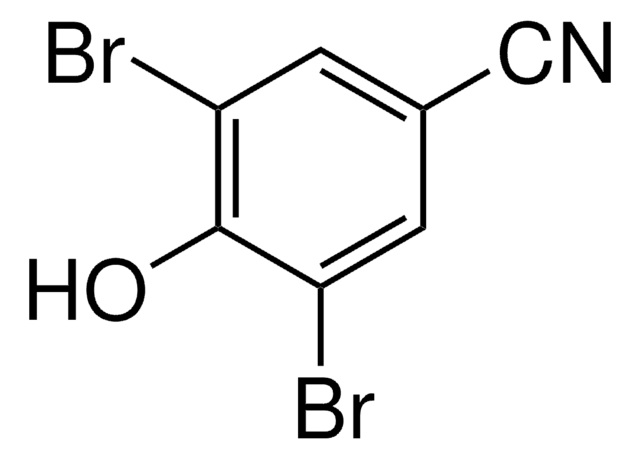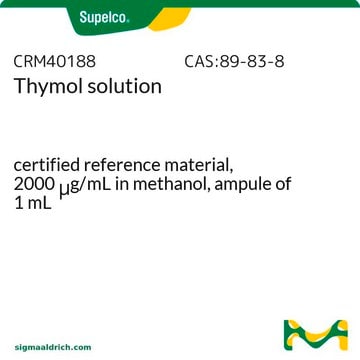50409
Thymol
Standard for quantitative NMR, TraceCERT®, Manufactured by: Sigma-Aldrich Production GmbH, Switzerland
Synonym(s):
2-Isopropyl-5-methylphenol, 5-Methyl-2-(1-methylethyl)phenol, 5-Methyl-2-isopropylphenol, IPMP
About This Item
Recommended Products
grade
Standard for quantitative NMR
certified reference material
Quality Level
vapor pressure
1 mmHg ( 64 °C)
description
qNMR Standard
product line
TraceCERT®
shelf life
limited shelf life, expiry date on the label
manufacturer/tradename
Manufactured by: Sigma-Aldrich Production GmbH, Switzerland
technique(s)
LC/MS: suitable
qNMR: suitable
bp
232 °C (lit.)
mp
48-51 °C (lit.)
density
0.965 g/mL at 25 °C (lit.)
application(s)
cleaning products
cosmetics
environmental
flavors and fragrances
food and beverages
personal care
pharmaceutical
format
neat
SMILES string
CC(C)c1ccc(C)cc1O
InChI
1S/C10H14O/c1-7(2)9-5-4-8(3)6-10(9)11/h4-7,11H,1-3H3
InChI key
MGSRCZKZVOBKFT-UHFFFAOYSA-N
Looking for similar products? Visit Product Comparison Guide
General description
Certified content by quantitative NMR incl. uncertainty and expiry date are given on the certificate.
Download your certificate at: http://www.sigma-aldrich.com.
Check out our entire range of quantitative NMR standards (qNMR standards)
Application
Other Notes
Recommended products
Legal Information
Signal Word
Danger
Hazard Statements
Precautionary Statements
Hazard Classifications
Acute Tox. 4 Oral - Aquatic Chronic 2 - Eye Dam. 1 - Skin Corr. 1B
Storage Class Code
8B - Non-combustible corrosive hazardous materials
WGK
WGK 2
Flash Point(F)
240.8 °F - closed cup
Flash Point(C)
116 °C - closed cup
Choose from one of the most recent versions:
Certificates of Analysis (COA)
Don't see the Right Version?
If you require a particular version, you can look up a specific certificate by the Lot or Batch number.
Already Own This Product?
Find documentation for the products that you have recently purchased in the Document Library.
Customers Also Viewed
Our team of scientists has experience in all areas of research including Life Science, Material Science, Chemical Synthesis, Chromatography, Analytical and many others.
Contact Technical Service












